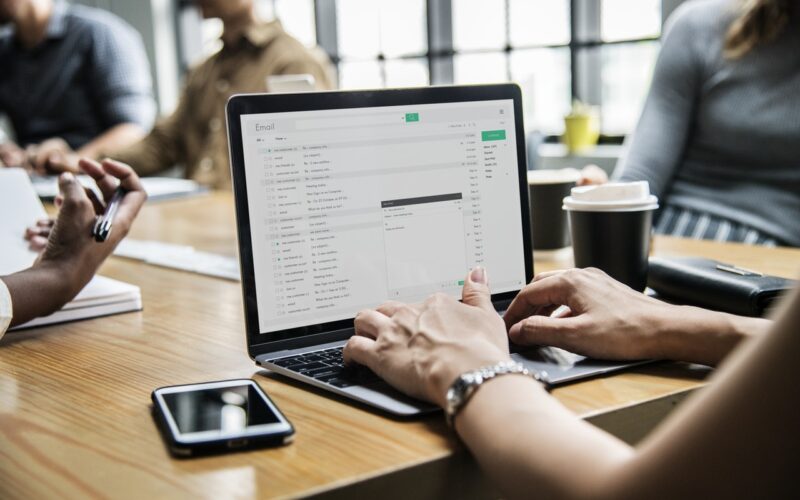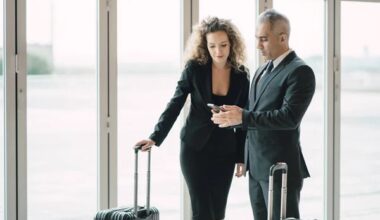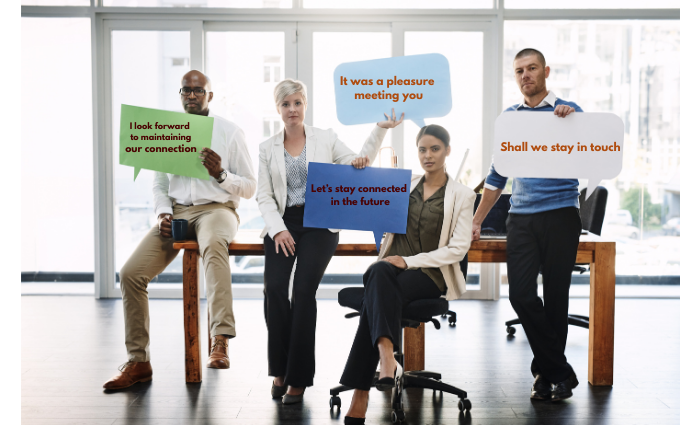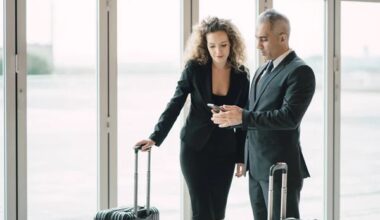Emails are a powerful tool for coordinating business trips, from initial planning to post-trip follow-ups.
Knowing how to write clear, polite, and effective emails is key to ensuring that logistics, meetings, and communication flow smoothly.
In this guide, we’ll cover the most essential email etiquette tips for organizing and following up on business travel, complete with practical examples and scenarios to show you how to put each tip into action.
Key Phrases for Email Etiquette in Business Trip Planning and Follow-Ups
- “I’m writing to confirm our meeting on [date]”
- “Could you please share the agenda for our upcoming trip?”
- “Would it be possible to schedule a quick call to discuss trip details?”
- “Please let me know if any additional arrangements are needed.”
- “Thank you for assisting with the hotel and travel bookings.”
- “Could you kindly provide any required travel documents?”
- “I wanted to follow up on our recent business trip and share some insights.”
- “May I request a summary of the meeting notes for my reference?”
- “Could we schedule a post-trip review meeting?”
- “Thank you again for your time and hospitality during my visit.”
10 Essential Email Etiquette Tips for Business Trip Planning and Follow-Ups
1. Confirming Meeting Dates and Times
When organizing a business trip, it’s important to confirm the date, time, and location of any meetings to avoid confusion. This clarity ensures that everyone involved is on the same page.
- Example Phrase:
“I’m writing to confirm our meeting on [date] at [time].” - Scenario:
Before your trip, send an email to the host company to confirm: “I’m writing to confirm our meeting on March 15th at 10 a.m. I look forward to discussing our collaboration in more detail.”
2. Requesting an Agenda for the Trip
Understanding the agenda helps you prepare effectively. A polite request for the schedule is professional and shows you value the other person’s time.
- Example Phrase:
“Could you please share the agenda for our upcoming trip?” - Scenario:
If you haven’t received a formal agenda, email your contact: “Could you please share the agenda for our upcoming trip? This will allow me to ensure I’m fully prepared for each discussion point.”
3. Scheduling a Pre-Trip Call for Clarity
Complex business trips may benefit from a pre-trip call to review logistics, expectations, and goals. This proactive approach avoids last-minute miscommunications.
- Example Phrase:
“Would it be possible to schedule a quick call to discuss trip details?” - Scenario:
Email your counterpart with, “Would it be possible to schedule a quick call to discuss trip details? I’d like to ensure we’re aligned on the meeting objectives.”
4. Clarifying Any Additional Arrangements Needed
Business trips often involve special requests, such as dietary preferences or specific presentation equipment. Clarifying any needs upfront demonstrates professionalism and reduces potential disruptions.
- Example Phrase:
“Please let me know if any additional arrangements are needed.” - Scenario:
A week before departure, email to confirm: “Please let me know if any additional arrangements are needed to make our meetings as productive as possible.”
5. Expressing Gratitude for Travel Support
If a colleague or assistant is coordinating travel logistics, acknowledging their help can strengthen your working relationship. A simple thank-you email reflects professionalism.
- Example Phrase:
“Thank you for assisting with the hotel and travel bookings.” - Scenario:
Send a note to your assistant or travel coordinator: “Thank you for assisting with the hotel and travel bookings. Your support in arranging these details is greatly appreciated!”
6. Requesting Necessary Travel Documents or Information
In international travel, certain documents, such as itineraries, visas, or entry requirements, are essential. Requesting these documents early demonstrates a proactive approach.
- Example Phrase:
“Could you kindly provide any required travel documents?” - Scenario:
A few weeks before departure, send an email: “Could you kindly provide any required travel documents, such as visa information or entry requirements, for the trip?”
7. Following Up After the Trip
A post-trip follow-up email is an excellent opportunity to summarize key points, share insights, and reinforce your commitment. It keeps the conversation alive and paves the way for continued collaboration.
- Example Phrase:
“I wanted to follow up on our recent business trip and share some insights.” - Scenario:
A few days after returning, email your contact: “I wanted to follow up on our recent business trip and share some insights from our discussions. I believe we have some strong directions to pursue and would love to discuss them further.”
8. Requesting Meeting Notes or Action Points
Clear documentation of action points from meetings ensures that all stakeholders remain informed and accountable. A polite request for meeting notes is both professional and practical.
- Example Phrase:
“May I request a summary of the meeting notes for my reference?” - Scenario:
After a meeting, follow up with: “May I request a summary of the meeting notes for my reference? This will help ensure I capture all the key points discussed.”
9. Proposing a Post-Trip Review Meeting
A review meeting allows you and your team to assess the trip’s outcomes, highlight successes, and discuss any necessary follow-up actions. Suggesting this meeting signals a proactive and strategic approach.
- Example Phrase:
“Could we schedule a post-trip review meeting?” - Scenario:
Send an email a week after returning: “Could we schedule a post-trip review meeting? I’d love to go over our results and identify next steps based on our meetings.”
10. Expressing Appreciation for Hospitality
A thank-you email after your trip reinforces goodwill and acknowledges the efforts made by your hosts. Expressing appreciation is a valuable aspect of business etiquette that leaves a positive, lasting impression.
- Example Phrase:
“Thank you again for your time and hospitality during my visit.” - Scenario:
After returning home, email your host: “Thank you again for your time and hospitality during my visit. I truly appreciated the warm welcome and am looking forward to our next steps.”
Practical Examples and Scenarios
Let’s explore a few comprehensive scenarios to see how these email etiquette tips work in real-life situations.
Scenario 1: Initial Trip Planning with a New Client
You’re planning a trip to meet a new client in London. You want to ensure that all details are aligned so that your trip is productive and well-organized.
1.Start with a polite confirmation of the meeting date and time:
Email: “I’m writing to confirm our meeting on April 5th at 9 a.m. I’m looking forward to our discussions.”
2. Request the agenda to ensure preparation:
Email: “Could you please share the agenda for our upcoming trip? This will allow me to prepare any necessary materials.”
3. Schedule a call to review any questions:
Email: “Would it be possible to schedule a quick call to discuss trip details? I’d like to ensure all objectives are covered.”
4. Conclude with gratitude for any assistance provided:
Email: “Thank you for assisting with the hotel bookings and travel arrangements. Your help is much appreciated!”
Scenario 2: Following Up After a Productive Trip
Your business trip went well, and now you want to keep the momentum going with a thoughtful follow-up.
1.Begin with a follow-up to thank the client and highlight key points:
Email: “I wanted to follow up on our recent business trip and share some key insights. I believe we have some exciting directions to explore.”
2. Request meeting notes or action points:
Email: “May I request a summary of the meeting notes? This will ensure that I capture all the key action points.”
3. Propose a review meeting to discuss the outcomes further:
Email: “Could we schedule a post-trip review meeting? I’d like to discuss our next steps and any potential areas for collaboration.”
4. Conclude with a note of gratitude:
Email: “Thank you once again for your hospitality and for making my visit such a productive experience.”
Scenario 3: Preparing for an International Business Trip
An international trip requires extra preparation due to travel regulations and potential cultural differences. Clear email communication helps coordinate the logistics smoothly.
1.Request any required travel documents well in advance:
Email: “Could you kindly provide any required travel documents, such as visa information?”
2. Confirm key meeting times and details:
Email: “I’m writing to confirm our meeting on October 12th. Could you please share any preliminary agenda items so I can prepare?”
3. Request additional arrangements if necessary:
Email: “Please let me know if there are any special requirements I should prepare for, such as presentation equipment.”
4. Express gratitude for the support provided:
Email: “Thank you for arranging the logistics for this trip. I appreciate all the help in making this visit possible.”
Conclusion
Practicing email etiquette in business trip planning and follow-ups can significantly improve the efficiency and professionalism of your communication.
Whether confirming meeting details, requesting agendas, or expressing gratitude, these tips enable clear, respectful communication that enhances your business relationships.
Following these email etiquette guidelines ensures that all parties are informed, prepared, and valued throughout the process.
With these examples and scenarios in mind, you can approach each email with confidence, knowing you’re fostering a productive and positive professional relationship.
Mastering email etiquette for business trips not only sets you apart as a courteous professional but also creates smoother, more efficient travel experiences.







